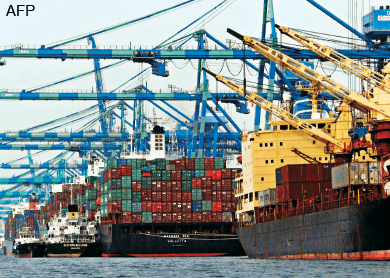
INTER-PACIFIC GROUP may not ring a bell with Malaysians but it is among the top five bunkering service providers in Hong Kong, and gaining market share in Singapore.
Dr Goh Jin Hian, son of former Singapore prime minister Goh Chok Tong, is a substantial shareholder in Inter-Pacific. The Cheung family in Hong Kong, which has extensive interests in the shipping industry, is another.
Goh, 46, is a medical doctor who switched careers from healthcare to bunkering and fuel trading. He sees substantial growth potential in the local oil and gas sector. Inter-Pacific is exploring opportunities in bunkering, logistics and storage facilities in Malaysia.
Its presence in Malaysia may take the group one step closer to becoming a regional player.
“Malaysia will grow as a [bunkering] hub for several reasons, such as the major shipping organisations that call at its ports, and [for its] oil and gas sector, in which bunkering services are vital for the vessels and oil rigs that require [consistent] fuel supply to keep their machinery going,” Goh tells The Edge.
According to him, Malaysia holds much potential for Inter-Pacific because of its thriving ports such as the Port of Tanjung Pelepas in Johor and Port Klang in Selangor.
The group also hopes to move into the cargo trade business by building relationships with oil majors operating in Malaysia.
“With regard to cargo trade in Malaysia, it will be very difficult for a small company like ours to be able to compete with the bigger players without a ‘value add’. For us, that lies in the expertise we bring as bunker suppliers. We not only trade cargo for our customers but also help them digest volume,” says Goh.
However, he stresses that Inter-Pacific’s intention to expand to Malaysia is not to compete with the other bunker players but to complement the growth of its operations in Singapore.
He gives the example of the shift from fixed-storage tank bunkering to liquefied natural gas bunkering in Singapore, and compares this with Malaysia’s potential for fixed-storage tanks. “In that sense, we plan to complement our services in both countries.”
Goh takes pride in one of the value-added services that Inter-Pacific can provide: the mass flow meter (MFM) system, which is said to enhance transparency, improve operational efficiency and increase productivity in the bunkering industry.
He says Inter-Pacific will be able to offer a niche service to its Malaysian customers, especially those that require bunker supply from MFM-fitted suppliers, as the system is not widely used in Malaysia.
“In Malaysia, the MFM system is not [yet] required by law, but should customers need the system, we have the experience to provide the [related] services,” he says.
The group obtained the bunkering licence for Inter-Pacific Petroleum on April 1, 2012, from the Maritime and Port Authority of Singapore (MPA) and currently owns and operates 14 vessels, of which four are in Singapore.
Last year, Inter-Pacific Petroleum ranked 29th out of 63 bunker suppliers in Singapore for volume, according to data from MPA.
“When we first started, we were ranked 80th in the market for volume. Within a year, we catapulted to 29th spot and today, we move about 80,000 tonnes of fuel per month,” says Goh.
He adds that there is no specific timeline for the group’s expansion to Malaysia, but it will be setting up office here this year.
“Our expansion plans are not driven by timelines. First, we need to ensure that our systems are in place and to understand how the Malaysian market works. Setting up office is the easy part, but finding the right fit with business partners will be time-consuming. We do not want to cut corners and rush ourselves,” he says.
He adds that it is too early for the group to decide on what kind of corporate structure it will have in Malaysia, and whether it would consider a joint venture.
“The key is for us to be able to develop a sustainable and enduring win-win relationship with stakeholders, and it is vital for both parties to be in agreement on what that scenario is,” he says.
However, Goh acknowledges that the Malaysian bunker supply market, though smaller than Singapore’s, will be able to provide synergies for the group.
He says the Malaysian bunker supply market is different from Singapore’s because of its different product requirements. Most vessels that call at Malaysian ports are smaller ones. These, and the bargers that support them, tend to run on diesel.
“[However] because of our client profile, we have a combination of vessels that require not only fuel oil but diesel, which is hopefully an area in which we can present ourselves to the Malaysian market,” Goh says.
He adds that bunker activities are a supporting segment to the oil and gas industry, and that Malaysia’s primary focus should be in growing its oil and gas exploration activities.
“I think Malaysia still has untapped areas in oil and gas exploration activities and, in my opinion, bunker services is an adjacent scene that will grow with these activities,” he says.
This article first appeared in The Edge Malaysia Weekly, on March 30 - April 5, 2015.
Save by subscribing to us for your print and/or digital copy.
P/S: The Edge is also available on Apple's AppStore and Androids' Google Play.